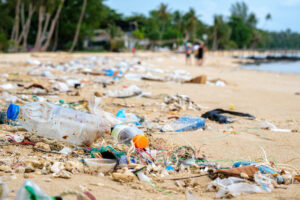
UN report targets 80 per cent reduction in plastics pollution by 2040
Canadian Plastics
Recycling SustainabilityThe report also suggests steps to help make recycled materials more cost-competitive compared with virgin plastics.

Photo Credit: Adobe Stock/filistimlyanin1
A new report by United Nations Environment Programme (UNEP) says that plastic pollution could reduced by 80 per cent by 2040 if countries and companies make deep policy and market shifts using existing technologies.
The report also suggests steps to help make recycled materials more cost-competitive compared with virgin plastics.
Released ahead of the second round of global plastics treaty talks in Paris later this month, the report – called Turning off the Tap: How the world can end plastic pollution and create a circular economy – is designed to outline “the magnitude and nature of the changes required” to end plastic pollution and create a circular economy, UNEP said.
To slash plastic pollution by 80 per cent globally by 2040, the report suggests first eliminating problematic and unnecessary plastics to reduce the size of the problem. The report found that the largest gains could be made toward the 80 per cent reduction from policy options like reusables, extended producer responsibility (EPR), and bottle deposits – it estimated these could account for a 30 per cent drop. UNEP also estimated that replacing products like plastic wrappers, sachets and takeaway items with alternatives, including paper and compostable packaging, could deliver an additional 17 per cent reduction.
Subsequently, the report calls for three market shifts – reuse, recycle, and reorient and diversify products.
First, for reuse, the report recommends that promoting reuse options, including refillable bottles, bulk dispensers, deposit-return-schemes, and packaging take-back schemes can reduce 30 per cent of plastic pollution by 2040. To realize its potential, governments must help build a stronger business case for reusables, the report said.
Second, the report said, reducing plastic pollution by an additional 20 per cent by 2040 can be achieved if recycling becomes a more stable and profitable venture. Removing fossil fuels subsidies, enforcing design guidelines to enhance recyclability, and other measures would increase the share of economically recyclable plastics from 21 to 50 per cent.
Third, under reorienting and diversifying, the report said that “careful replacement” of products such as plastic wrappers, sachets and takeaway items with products made from alternative materials (such as paper or compostable materials) can deliver an additional 17 per cent decrease in plastic pollution.
Even with the measures above, UNEP said, 100 million metric tons of plastics from single-use and short-lived products will still need to be safely dealt with annually by 2040, along with plastics pollution already in the environment. “UNEP suggests setting and implementing design and safety standards for disposing of non-recyclable plastic waste and making manufacturers responsible for products shedding microplastics,” the agency said.
Overall, the shift to a circular economy would result in $1.27 trillion in savings, considering costs and recycling revenues, UNEP said, with a further $3.25 trillion being saved from avoided externalities such as health, climate, air pollution, marine ecosystem degradation, and litigation-related costs. “This can be addressed by setting and implementing design and safety standards for disposing of non-recyclable plastic waste, and by making manufacturers responsible for products shedding microplastics, among others,” the report said.
The report also recommended that a global fiscal framework could be part of a policy pact to enable recycled materials to compete on a level playing field with virgin materials, create an economy of scale for solutions, and establish monitoring systems and financing mechanisms.
The full report is available here.
